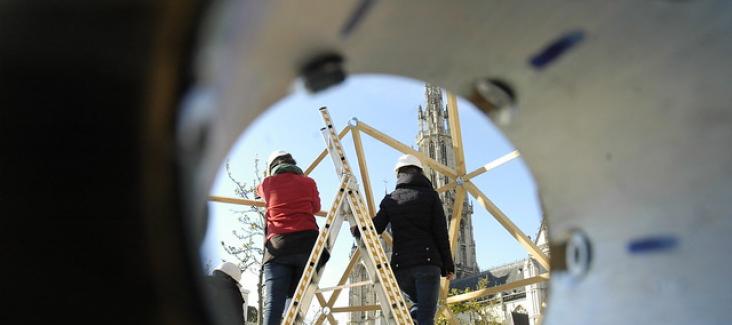Altogether the BeNeLux tour was a resounding success. With only weeks to go until the European elections, more than 150 participants in 11 cities and three countries came out to talk under our Europe Dome. We started in Liège with three Talks. Then we had two talks per day in Brussels, Antwerp, Ghent, Maastricht, Den Burg (Texel), Amsterdam, The Hague, Zandvoort, Schengen and Luxembourg City. We set up our Europe Dome at the most varied locations: Markets, shopping centres, museum squares, arcades in converted station halls, an old Dominican monastery and even on the beach.
It was especially good to see that people also enjoyed their time under the dome. If before coming in they had mentioned that they only had a few minutes’ time, many of them ended up staying for the whole conversation. At the same time, we have had to come up with new ideas to lower the threshold for people to step into the dome. Many of them found it difficult to share their opinions in a public forum. We’ve heard many variations of the sentence "I don’t know anything about this and cannot contribute anything to the conversation.” This way, the disempowering character of the current democratic discourse in Europe became painfully clear to us. Despite of people’s initial hesitation, we were continuously amazed by their high-quality input into the debates.
We had defined specific themes for each talk in advance to make it easier for participants to get started. We discussed a wide range of topics, from the new European Parliament to food security. Particularly questions on environmental protection and sustainability proved to be on people’s mind in the Benelux countries: Young and old, not much persuasion was needed in these currently central and hotly debated issues.
At the same time, democracy, participation and co-determination were central elements of all of the discussions, regardless of the issue we proposed. Lack of communication, paternalism and the lack of opportunities to exert influence on political events were repeatedly mentioned as obvious flaws in our common European system. We citizens do notice it! And we notice it in all over Europe.
As organisers, we were most impressed by how sustainable the short, and factually random encounters proved to be. The European Public Sphere aims to get people out of their filter bubbles by confronting them with opinions of people they wouldn’t normally discuss with. The conversations lay bare the participants’ own mental limits and assumptions, and almost always when they leave the dome, they take new ideas and suggestions with them.
Today we can say with full conviction that this is exactly what the project has achieved for us. And the size of the discussion groups did not matter: three people can easily spend 90 minutes intensely and profoundly talking to each other.
For some more insight into the Benelux tour, video recordings and blog entries of the dialogues are already available on the project website and Youtube. At the moment we are in the final stages of working on an idea catalogue that will list concrete ideas of the participants. This will be the first of many and will be handed over by Democracy International to the newly elected European Parliament in November of this year.
As much as we are looking forward to the handover though, throughout June we have to put work on this catalogue on hold, because we are adding Poland to the list of countries that the sphere has visited, and we will also visit the German capital Berlin. Now even more citizens can share their wealth of ideas with us and carry their voice to the European institutions, even after the elections.
Especially exciting to us is that in Poland, young people are at the centre of the discussion. This is why we will visit two international youth camps and a university. One of our stops will be Krzyzowa, which was formerly known by its German name Kreisau, and where the Nazi resistance group Kreisauer Kreis met. It was also the place of the German-Polish reconciliation fair in 1989. Here, German and Polish youth groups will meet under our dome. Near Gdansk, we will be joined by young people from the 11 North Sea states and Iceland. And in Krakow, we will set up at the Jagiellonian University, the oldest of the country and one of the oldest in Europe, where we expect a colourful mixture because of its 94 faculties.
You can find more information about dates and opportunities to join in here.

